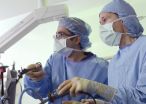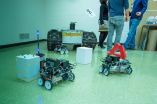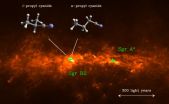(Press-News.org) DALLAS – Sept. 25, 2014 – Gastric bypass surgery has better outcomes than gastric banding for long-term weight loss, controlling type 2 diabetes and high blood pressure, and lowering cholesterol levels, according to a new review by UT Southwestern Medical Center surgeons of nearly 30 long-term studies comparing the two types of bariatric procedures.
The review, appearing in JAMA, found that those undergoing gastric bypass operations lost more weight — an average of 66 percent of their excess weight, compared to 45 percent average excess weight loss for those undergoing gastric banding procedures.
"We know gastric bypass brings more weight loss success and relief of commonly associated illness versus gastric band at one year after surgery. We now have the best evidence available telling us this outcome continues to be true even up to five years after surgery. We also know these procedures maintain their safety profile long-term," said Dr. Nancy Puzziferri, Assistant Professor of Surgery and part of the bariatric surgery team at UT Southwestern.
According to a 2011 estimate, some 120,000 bariatric procedures are performed annually in the U.S. Worldwide, gastric bypass accounts for about 47 percent of weight loss procedures, while gastric bands account for about 18 percent.
Researchers found dramatic differences between the two procedures in controlling diabetes. More than two-thirds of gastric bypass patients with Type 2 diabetes saw remission of the disease, compared to less than a third of gastric band patients.
Gastric bypass surgery also lowered hypertension better than gastric banding. Nearly half of patients (48 percent) with hypertension reported remission after two years with gastric bypass, compared to less than a fifth (17 percent) for those undergoing gastric band procedures.
Gastric bypass also improved hyperlipidemia, characterized by high levels of cholesterol, triglycerides, and lipoproteins in the blood. About 60 percent of gastric bypass patients reported remission in the studies, compared to about 23 percent of gastric band patients.
"The review underscores the importance of thinking about durable treatments, as obesity, type 2 diabetes, hypertension, and elevated cholesterol are chronic illnesses, rather than focusing on short-term results," Dr. Puzziferri said.
Long-term complication rates for the two procedures also favored gastric bypass, through both were relatively low — less than 3 percent for bypass surgery and less than 5 percent for banding procedures.
The review focused only on studies that followed patients for at least two years and in which more than 80 percent of patients were successfully tracked during that time; 29 studies total. Most – 97 percent – of weight-loss surgery studies track only a small percent of patients and/or only for up to one year. The researchers suggested more studies are needed to look at long-term outcomes – at least two years past the initial surgery – while maintaining follow-up of at least 80 percent to be considered reliable. They also concluded there were not a sufficient number of studies meeting these criteria to accurately assess gastric sleeve procedures.
"It is also very important to understand sleeve gastrectomy, which with the evidence we have so far, appears to perform as well as gastric bypass for weight loss. We just don't have as much evidence, in quantity or quality, as we have for the other procedures. The evidence will come in time," Dr. Puzziferri said. "We have not been doing sleeve gastrectomies for as many years as we have been performing gastric bypass or gastric band surgeries."
Gastric bypass, known as Roux-en-Y (pronounced "roo-n-why") gastric bypass, is considered the gold standard and one of the most commonly performed weight-loss procedures. Surgeons create a smaller stomach pouch and reroute food to bypass part of the small intestine. Gastric band procedures install an inflatable band around a portion of the stomach that can be adjusted to limit food intake. With both procedures, patients feel fuller more quickly, and therefore eat less and consume fewer calories.
INFORMATION:
UT Southwestern is a certified Bariatric Surgery Center of Excellence by the Metabolic and Bariatric Surgery Accreditation and Quality Improvement Program (MBSAQIP) and serves as a regional and national referral center. Among its milestones are being the first to perform gastric banding with single-incision laparoscopic surgery in North Texas, the first to perform laparoscopic adjustable gastric banding (Lap-Band) in North Texas, and the first to perform the laparoscopic Roux-en-Y gastric bypass in North Texas.
About UT Southwestern Medical Center
UT Southwestern, one of the premier academic medical centers in the nation, integrates pioneering biomedical research with exceptional clinical care and education. The institution's faculty includes many distinguished members, including six who have been awarded Nobel Prizes since 1985. Numbering more than 2,700, the faculty is responsible for groundbreaking medical advances and is committed to translating science-driven research quickly to new clinical treatments. UT Southwestern physicians provide medical care in 40 specialties to nearly 91,000 hospitalized patients and oversee more than 2 million outpatient visits a year.
This news release is available on our home page at
http://www.utsouthwestern.edu/home/news/index.html
To automatically receive news releases from UT Southwestern via email,
subscribe at http://www.utsouthwestern.edu/receivenews
Gastric bypass bests banding for weight loss, diabetes, high blood pressure and cholesterol control
2014-09-25
ELSE PRESS RELEASES FROM THIS DATE:
Bariatric surgery not a magic wand to curb depression
2014-09-25
Most severely obese people experience much better spirits once they shed weight through a diet, lifestyle changes or medical intervention. This is unfortunately not true for everyone, says Valentina Ivezaj and Carlos Grilo of the Yale University School of Medicine in the US. In an article in Springer's journal Obesity Surgery, the researchers advise that the levels of depression in patients be measured six to 12 months after they have had such bariatric surgery. This will ensure that the necessary help can be provided when needed.
Ivezaj and Grilo set out to investigate ...
Long-term unemployed struggle as economy improves, Rutgers study finds
2014-09-25
NEW BRUNSWICK, N.J. – While the unemployment rate for people out of work for six months or less has returned to prerecession levels, the levels of unemployment for workers who remain jobless for more than six months is among the most persistent, negative effects of the Great Recession, according to a new national study at Rutgers. In fact, one in five workers laid off from a job during the last five years are still unemployed and looking for work, researchers from the John J. Heldrich Center for Workforce Development found.
Among the key findings of "Left Behind: The ...
Blackout? Robots to the rescue
2014-09-25
Big disasters almost always result in big power failures. Not only do they take down the TV and fridge, they also wreak havoc with key infrastructure like cell towers. That can delay search and rescue operations at a time when minutes count.
Now, a team led by Nina Mahmoudian of Michigan Technological University has developed a tabletop model of a robot team that can bring power to places that need it the most.
"If we can regain power in communication towers, then we can find the people we need to rescue," says Mahmoudian, an assistant professor of mechanical engineering–engineering ...
Drivers admit to risky behaviors in RU-Eagleton, NJ Medical School public health poll
2014-09-25
NEW BRUNSWICK, N.J. – In a state famous for its turnpike and infamous for traffic, tolls and "Jersey drivers," a new partnership between the Rutgers-Eagleton Poll and Rutgers New Jersey Medical School (NJMS) has launched a series of public health polls with a survey about risky driving habits. New Jerseyans were asked about their perceptions of safety both as a driver and passenger.
"Three-quarters of New Jerseyans are behind the wheel nearly every day. They are continually at the center of jokes and have even been ranked as some of the worst drivers in the country," ...
Dunes reveal biodiversity secrets
2014-09-25
Ancient, acidic and nutrient-depleted dunes in Western Australia are not an obvious place to answer a question that has vexed tropical biologists for decades. But the Jurien Bay dunes proved to be the perfect site to unravel why plant diversity varies from place to place. Smithsonian Tropical Research Institute scientist Benjamin Turner and colleagues from the University of Western Australia published findings in the Sept. 26 edition of Science showing that environmental filtering—but not a host of other theories—determines local plant diversity in one of Earth's biodiversity ...
Tropical disease prevalence in Latin America presents opportunity for US
2014-09-25
HOUSTON – (Sept. 25, 2014) – Recently published prevalence estimates of neglected tropical diseases (NTDs) in five Latin American countries — Bolivia, Cuba, Ecuador, Nicaragua and Venezuela — could suggest a new direction for United States foreign policy in the region, according to a tropical-disease expert at Rice University's Baker Institute for Public Policy.
Dr. Peter Hotez, the fellow in disease and poverty at the Baker Institute, outlined his insights in a new editorial, "The NTDs and Vaccine Diplomacy in Latin America: Opportunities for United States Foreign Policy," ...
Stem cell transplant does not cure SHIV/AIDS after irradiation of infected rhesus macaques
2014-09-25
A study published on September 25th in PLOS Pathogens reports a new primate model to test treatments that might cure HIV/AIDS and suggests answers to questions raised by the "Berlin patient", the only human thought to have been cured so far.
Being HIV-positive and having developed leukemia, the Berlin patient underwent irradiation followed by a bone-marrow transplant from a donor with a mutation that abolishes the function of the CCR5 gene. The gene codes for a protein that facilitates HIV entry into human cells, and the mutation—in homozygous carriers who, like the donor, ...
Interstellar molecules are branching out
2014-09-25
Scientists from the Max Planck Institute for Radio Astronomy (Bonn, Germany), Cornell University (USA), and the University of Cologne (Germany) have for the first time detected a carbon-bearing molecule with a "branched" structure in interstellar space. The molecule, iso-propyl cyanide (i-C3H7CN), was discovered in a giant gas cloud called Sagittarius B2, a region of ongoing star formation close to the center of our galaxy that is a hot-spot for molecule-hunting astronomers. The branched structure of the carbon atoms within the iso-propyl cyanide molecule is unlike the ...
Stone Age site challenges old archaeological assumptions about human technology
2014-09-25
The analysis of artifacts from a 325,000-year-old site in Armenia shows that human technological innovation occurred intermittently throughout the Old World, rather than spreading from a single point of origin, as previously thought.
The study, published today in the journal Science, examines thousands of stone artifacts retrieved from Nor Geghi 1, a unique site preserved between two lava flows dated to 200,000–400,000 years ago. Layers of floodplain sediments and an ancient soil found between these lava flows contain the archaeological material. The dating of volcanic ...
Earth's water is older than the sun
2014-09-25
Washington, D.C.—Water was crucial to the rise of life on Earth and is also important to evaluating the possibility of life on other planets. Identifying the original source of Earth's water is key to understanding how life-fostering environments come into being and how likely they are to be found elsewhere. New work from a team including Carnegie's Conel Alexander found that much of our Solar System's water likely originated as ices that formed in interstellar space. Their work is published in Science.
Water is found throughout our Solar System. Not just on Earth, but ...



